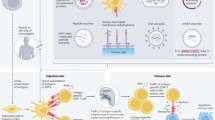Abstract
Preclinical studies demonstrated the ability of an adenovirus/PSA (Ad/PSA) vaccine to induce strong anti-PSA immune responses, and these responses were capable of destroying prostate-specific antigen (PSA)-secreting mouse prostate tumors. A series of preclinical studies have demonstrated the superiority of the Ad/PSA vaccine to other PSA vaccines for the induction of anti-PSA immune responses, the ability of Ad/PSA vaccination combined with cytokine gene therapy and the TLR9 agonist CpG to enhance the anti-prostate tumor immunotherapy, and the reduction of negative regulatory elements when the vaccine was combined with 5-fluoruracil administration. A phase I clinical trial of the Ad/PSA vaccine in men with metastatic castrate-resistant prostate cancer demonstrated the safety of the vaccine even at the highest single dose permitted by the FDA. Currently, a phase II trial of the Ad/PSA vaccine is underway treating patients in two protocols. Thus far 81 patients have been enrolled and vaccinated. Early results from the patients evaluated to date demonstrated the induction of anti-PSA T cell responses, and the majority of patients evaluated at this time had demonstrated an increase in PSA doubling times.




Similar content being viewed by others
References
Siegel R, et al. Cancer statistics, 2014. CA Cancer J Clin. 2014;64(1):9–29.
Heidenreich A, et al. EAU guidelines on prostate cancer. Part 1: screening, diagnosis, and treatment of clinically localised disease. Eur Urol. 2011;59(1):61–71.
Thompson I, et al. Guideline for the management of clinically localized prostate cancer: 2007 update. J Urol. 2007;177(6):2106–31.
Gaztanaga M, Crook J. Androgen deprivation therapy: minimizing exposure and mitigating side effects. J Natl Comp Cancer Netw. 2012;10(9):1088–95 quiz 1088, 1096.
de Bono JS, et al. Prednisone plus cabazitaxel or mitoxantrone for metastatic castration-resistant prostate cancer progressing after docetaxel treatment: a randomised open-label trial. Lancet. 2010;376(9747):1147–54.
Tannock IF, et al. Docetaxel plus prednisone or mitoxantrone plus prednisone for advanced prostate cancer. N Engl J Med. 2004;351(15):1502–12.
Attard G, et al. Selective inhibition of CYP17 with abiraterone acetate is highly active in the treatment of castration-resistant prostate cancer. J Clin Oncol. 2009;27(23):3742–8.
Nadal R, Taplin ME, Bellmunt J. Enzalutamide for the treatment of prostate cancer: results and implications of the AFFIRM trial. Future Oncol. 2014;10(3):351–62.
Lubaroff DM. Prostate cancer vaccines in clinical trials. Expert Rev Vaccines. 2012;11(7):857–68.
Buckwalter MR, Srivastava PK. “It is the antigen(s), stupid” and other lessons from over a decade of vaccitherapy of human cancer. Semin Immunol. 2008;20(5):296–300.
Elzey BD, et al. Immunization with type 5 adenovirus recombinant for a tumor antigen in combination with recombinant canary pox virus (ALVAC) cytokine gene delivery induces destruction of established prostate tumors. Int J Cancer. 2001;94(6):842–9.
Karan D, Krieg AM, Lubaroff DM. Paradoxical enhancement of CD8 T cell-dependent anti-tumor protection despite reduced CD8 T cell responses with addition of a TLR9 agonist to a tumor vaccine. Int J Cancer. 2007;121(7):1520–8.
Lubaroff DM, et al. Decreased cytotoxic T cell activity generated by co-administration of PSA vaccine and CpG ODN is associated with increased tumor protection in a mouse model of prostate cancer. Vaccine. 2006;24(35–36):6155–62.
Geary SM, et al. Tumor immunotherapy using adenovirus vaccines in combination with intratumoral doses of CpG ODN. Cancer Immunol Immunother CII. 2011;60(9):1309–17.
Madan RA, et al. Clinical evaluation of TRICOM vector therapeutic cancer vaccines. Semin Oncol. 2012;39(3):296–304.
Kuriyama S, Tominaga K, Kikukawa M, Nakatani T, Tsujinoue H, Yamazaki M, Nagao S, Toyokawa Y, Mitoro A, Fukui H. Inhibitory effects of human sera on adenovirus-mediated gene transfer into rat liver. Anticancer Res. 1998;18:2345.
Siemens DR, et al. Cutting edge: restoration of the ability to generate CTL in mice immune to adenovirus by delivery of virus in a collagen-based matrix. J Immunol. 2001;166(2):731–5.
Joshi VB, Geary SM, Salem AK. Biodegradable particles as vaccine antigen delivery systems for stimulating cellular immune responses. Hum Vaccin Immunother. 2013;9(12):2584–90.
Lubaroff DM, et al. Clinical protocol: phase I study of an adenovirus/prostate-specific antigen vaccine in men with metastatic prostate cancer. Hum Gene Ther. 2006;17(2):220–9.
Lubaroff DM, et al. Phase I clinical trial of an adenovirus/prostate-specific antigen vaccine for prostate cancer: safety and immunologic results. Clin Cancer Res. 2009;15(23):7375–80.
Halabi S, et al. Prognostic model for predicting survival in men with hormone-refractory metastatic prostate cancer. J Clin Oncol. 2003;21(7):1232–7.
Drake CG, et al. Androgen ablation mitigates tolerance to a prostate/prostate cancer-restricted antigen. Cancer Cell. 2005;7(3):239–49.
Mercader M, et al. T cell infiltration of the prostate induced by androgen withdrawal in patients with prostate cancer. Proc Natl Acad Sci USA. 2001;98(25):14565–70.
Roden AC, et al. Augmentation of T cell levels and responses induced by androgen deprivation. J Immunol. 2004;173(10):6098–108.
Sutherland JS, et al. Activation of thymic regeneration in mice and humans following androgen blockade. J Immunol. 2005;175(4):2741–53.
Bronte V, Mocellin S. Suppressive influences in the immune response to cancer. J Immunother. 2009;32(1):1–11.
Geary SM, et al. The combination of a low-dose chemotherapeutic agent, 5-fluorouracil, and an adenoviral tumor vaccine has a synergistic benefit on survival in a tumor model system. PLoS One. 2013;8(6):e67904.
Author information
Authors and Affiliations
Corresponding author
Additional information
Richard D. Williams is deceased.
Rights and permissions
About this article
Cite this article
Lubaroff, D.M., Vaena, D., Brown, J.A. et al. Vaccine immunotherapy for prostate cancer: from mice to men. Immunol Res 59, 229–235 (2014). https://doi.org/10.1007/s12026-014-8531-2
Published:
Issue Date:
DOI: https://doi.org/10.1007/s12026-014-8531-2




